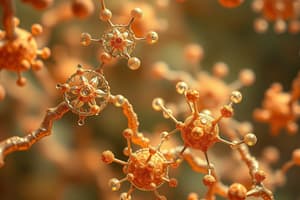Podcast
Questions and Answers
What is the simplest definition of biochemistry?
What is the simplest definition of biochemistry?
- Study of the chemical processes in living organisms
- Chemistry of the living cell (correct)
- Application of physics to biological processes
- Study of the molecular basis of diseases
Why do biochemists study carbohydrates, lipids, proteins, and nucleic acids?
Why do biochemists study carbohydrates, lipids, proteins, and nucleic acids?
- To study geological formations
- To determine the chemical bases of inheritance and disease (correct)
- To understand brain function
- To explore communication within cells
What role does biochemistry play in studying diseases?
What role does biochemistry play in studying diseases?
- Providing explanations for the causes of diseases (correct)
- Identifying treatment options for diseases
- Focuses solely on plant diseases
- Studies only inherited diseases
What type of molecules are often made up of monomer subunits in biochemistry?
What type of molecules are often made up of monomer subunits in biochemistry?
In biochemistry, what do biochemists explore through the study of proteins, nucleic acids, and other biomolecules?
In biochemistry, what do biochemists explore through the study of proteins, nucleic acids, and other biomolecules?
What aspect of inheritance do biochemists study through nucleic acids?
What aspect of inheritance do biochemists study through nucleic acids?
What is the main focus of biochemistry in relation to living organisms?
What is the main focus of biochemistry in relation to living organisms?
What is the primary reason for biochemists to study lipids and their functions?
What is the primary reason for biochemists to study lipids and their functions?
What distinguishes biochemistry from other scientific disciplines?
What distinguishes biochemistry from other scientific disciplines?
Match the following with their correct descriptions:
Match the following with their correct descriptions:
Match the following terms with their role in biochemistry:
Match the following terms with their role in biochemistry:
Match the following applications with their focus in biochemistry:
Match the following applications with their focus in biochemistry:
Match the following molecules with their functions in living cells:
Match the following molecules with their functions in living cells:
Match the following terms with their roles in biochemistry research:
Match the following terms with their roles in biochemistry research:
Match the following concepts with their significance in biochemistry:
Match the following concepts with their significance in biochemistry:
Match the following statements with the correct explanation:
Match the following statements with the correct explanation:
Match the following areas with their relevance to biochemistry research:
Match the following areas with their relevance to biochemistry research:
Match the following reasons with their importance for studying biochemistry:
Match the following reasons with their importance for studying biochemistry:
Biochemistry only uses the laws of chemistry to explain the processes of living cells.
Biochemistry only uses the laws of chemistry to explain the processes of living cells.
Biochemistry is solely a life science and does not involve any aspects of chemical science.
Biochemistry is solely a life science and does not involve any aspects of chemical science.
The molecules studied by biochemists include carbohydrates, lipids, proteins, and nucleic acids.
The molecules studied by biochemists include carbohydrates, lipids, proteins, and nucleic acids.
Polymer molecules in biochemistry are usually composed of a single type of monomer subunit.
Polymer molecules in biochemistry are usually composed of a single type of monomer subunit.
Flashcards are hidden until you start studying




